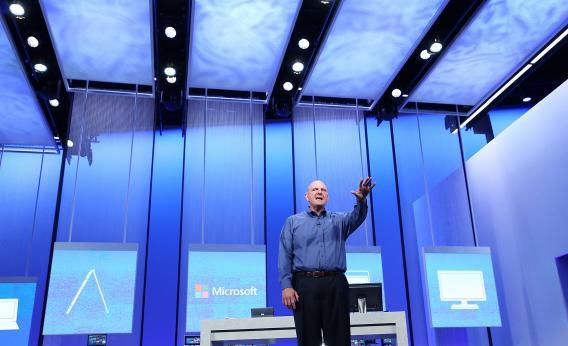It’s been an awfully long time since Microsoft’s been sexy or gotten a ton of buzz, so it’s easy to overlook how well it’s done in practice. Well, that is, until last week when suddenly all the doubts about the firm that have simmered for years seemed to be striking. Here’s a long view of Microsoft’s stock:
The long road up, the bubble of the late 1990s, and then a remarkable stability built on solid, consistent, high Windows/Office-driven profits and steady dividends.
And last week:
That’s all about their fourth quarter earnings report where both revenues and profits came in billions of dollars below Wall Street expectations. Even more disturbing, the company acknowledged $900 million of inventory write downs based on Surface RT machines. That’s when a company acknowledges, for accounting purposes, that they aren’t actually going to be able to sell products they’ve already built so the inventory doesn’t have the value they originally attributed to it anymore. That matters not just because of the $900 million but because of what it says about the company’s ability to escape the steady decline of the traditional PC form factor, especially as ultra-cheap Chromebooks start attacking the low end of the shrinking market.
The interesting thing about this is that for all Microsoft’s problems it’s still a big and enormously profitable company. Its Windows/Office operation is shrinking but lucrative, and its enterprise business doesn’t seem to have enormous growth potential but it is, again, quite lucrative. ValueAct, an activist investment management firm based in San Francisco, has been buying up shares and clamoring for a seat on the board as well as a change in strategic direction. Over the weekend, Reuters broke the news that Microsoft is entering serious negotiations over the board seat. But a board seat is rarely just a board seat. Back in April, ValueAct’s Jeffrey Ubben explained that his vision was for Microsoft to forget about consumer products and focus on cloud computing, while demanding board seats sure seems like a vote of no confidence in the current management team.
It’s a fascinating drama and a striking outbreak of weakness for a firm that less than 15 years ago was widely regarded as an abusive monopoly.
